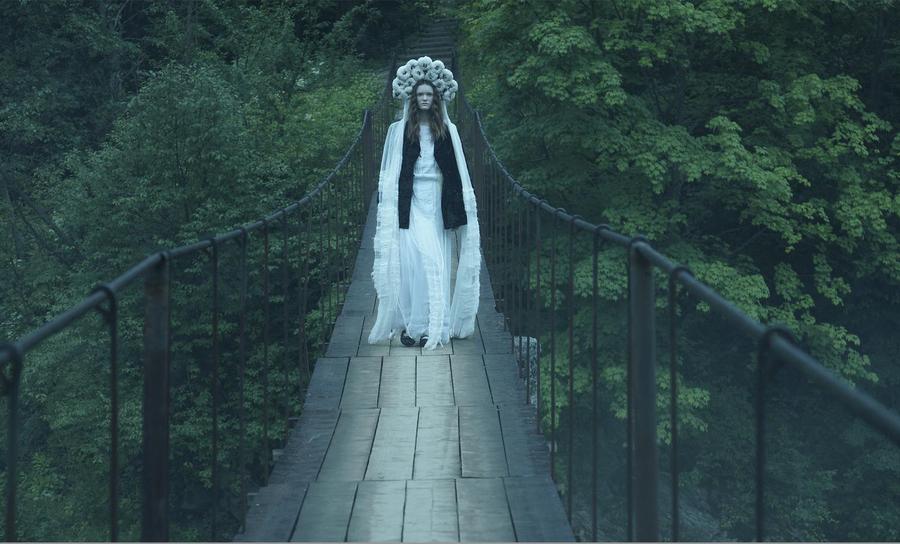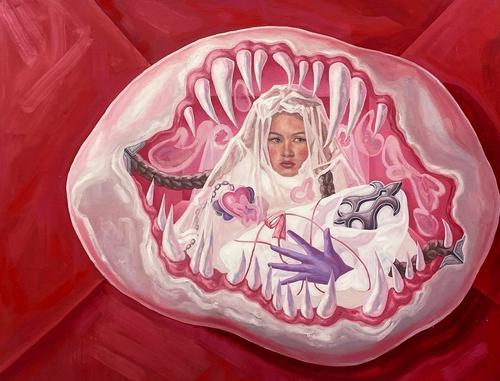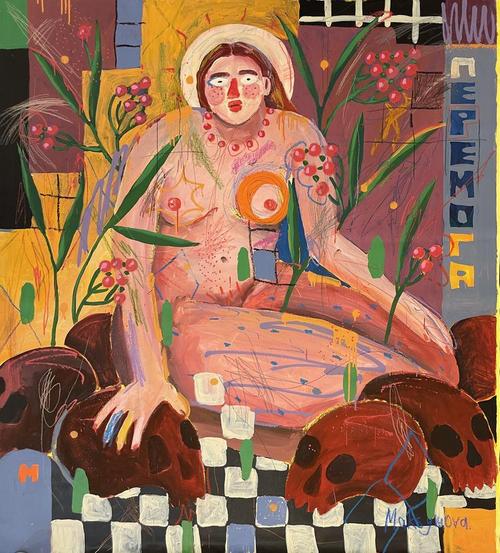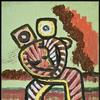'Women and Other Wild Creatures: Matrilineal Tales' at Sapar Contemporary Features Ukrainian and International Artists
- NEW YORK, New York
- /
- June 01, 2022

The woman looks at the sky and says, “Upend it all.
Now fall follows summer, before winter comes.
There’s a time for roses and a time for bitter wormwood,
a place for every beast, and every weed and grass,
only I have no place of my own.” And the sky answers,
“Make it yourself. You’re on your own now.”
- Kateryna Babkina, March, 2022
translated from the Ukrainian by Virlana Tkacz and Wanda Phipps
Sapar Contemporary is thrilled to present Women and Other Wild Creatures: Matrilineal Tales, a group exhibition (June 3 - July 15, 2022) of women artists who draw strength from the connection with the non-human nature, involving it in their healing practices and increasingly fantastical visions of human unity with nature. The show includes artists from Ukraine (Zinaida, Rita Maikova, Iryna Maksymova and poet Kateryna Babkina) and Kazakhstan (Aya Shalkar and Yerke Abuova), representing the gallery’s DNA, as well as works by French (Nicole Peyrafitte) and American (Susan Coyne) artists working in the U.S.

The inspiration for the exhibition came from seeing intergenerational caravans of grandmothers, mothers, daughters, and family pets migrating from the war zones, as well as the images of nature’s destruction in Ukraine: suffering trees, plants, animals of all kinds, and the whole steppe and wetland ecosystems – in addition to cultivated land. These images have been deeply felt at the gallery whose founders have family, friends, artists, and roots in Ukraine. The sense of terror brought to mind sources of strength available to women, connections that they forge across time and space, rituals recovered and re-invented in times of cataclysms. Ukrainian poet, Kateryna Babkina, contributed a poem she has written in March 2022, which was translated in English by Virlana Tkacz and Wanda Phipps for the exhibition. The poem opens with a line: Give me a brother who can protect me; woman is seeking protector and shelter, the sky responds with the final line of the poem: Make it yourself. You are on your own.
ZINAIDA (Ukraine) is a Ukrainian visual and performance artist and designer. She received her BA from the National Academy of Fine Arts and Architecture in Fine Art and Art History, as well as a BA in Psychology from National University of Kyiv. She is a member of the Food of War International Community. In 2015, she was a project facilitator at Marina Abramovic — In Residence (Kaldor Public Art Project, Sydney, Australia). ZINAIDA’s practice evolves around the study of mythologies, national and archaic images, and their conveyance using contemporary art. In her work, the artist focuses mainly on the original art-work of women as the sacred knowledge carriers. ZINAIDA conducted research in different parts of Ukraine, including the Chornobyl Exclusion Zone.

Iryna Maksymova (Ukraine) is a Ukrainian figurative artist. She was born and raised in Kolomyia, a small town in the western part of Ukraine, and now lives and works in Lviv. Maksymova’s work features colorful domestic settings with exotic creatures imbued with a magical quality, whose facial features contort in displays of distress or agony, encouraging the viewer to question the relationship between humans and animals. The storyline, the color palette, text and characters in Maksymova's works blend street art vocabulary and techniques with Ukrainian Primitivism on the 20th century and the tradition of Ukrainian self-taught women artists.
Rita Maikova (Ukraine) is a Ukrainian figurative artist who lives and works in Kyiv, Ukraine. She earned her BA from Kyiv National University of Technology and Design, as well as her MA from the National Academy of Art. Maikova has been exhibited widely in Ukraine and across Europe. Her work focuses on spiritual reality and meditative stillness. She sees her art as an endless dialogue between the soul and the universe. By investing thoroughly in mindfulness and the present, Maikova’s surrealist works are full of symbols, progressing between the conscious and unconscious mind, and inviting the imagination of the viewer.
Kateryna Babkina (Ukraine) is a Ukrainian poet, prose writer, columnist, screenwriter, and playwright. She's the author of four poetry collections (Lights of Saint Elm, 2002, The Mustard, 2011, Painkillers and Sleeping pills, 2014, Charmed for Love, 2017, Does not hurt, 2021), a novel (Sonia, 2013), a novel in short stories (My Grandfather Danced the Best, 2019) and two collections of stories (Lilu after you, 2008 and Happy naked people, 2016). Her writings have been translated into 10 languages. Her plays have been staged in Kyiv, Vienna and Geneva.
Aya Shalkar (Kazakhstan/US) is a Kazakh conceptual multimedia artist currently based in Los Angeles. She studies at the Visual Arts at the University of Strasbourg and received her MA in Graphic Design from University of Applied Arts Vienna in Austria. Shalkar’s artistic practice is rooted in her Central Asian background and Kazakh visual and material culture, with many of her works touching the subject of cultural identity and gender roles. She includes the techniques of embroidery, patchwork and other forms of traditional applied arts that are predominantly practiced by women. Her artistic universe is a place where Central Asian heritage meets science fiction and fantasy. Shalkar has been featured in Nowness, i-D Magazine, Elle, Sleek, and Blood.
Yerke Abuova (Kazakhstan/US) is a Kazakh-American figurative artist, who has been painting and exhibiting her work since her early teens. She is currently pursuing painting at Cornell University. Abuova works in a variety of media, but primarily focuses on oil painting, murals and sculpture. She depicts complex surreal environments that invent their own logic and create new rules for scale and color. These fantasy worlds explore the themes of memory, cultural histories, ecological anxieties and Central Asian femininity. Abuova also connected her traditional oil painting practice with digital imagery and digitally altered forms.
Susan Coyne (US) is an illustrator and writer who divides her time between New York City and Cambridge, Massachusetts. She graduated in 2016 from the School of the Arts (SVA) with the MFA: Illustration as Visual Essay program. Her new painting series, Fields of Vision, explores an imagined future in which women are the founders of a collective rural society and maintain it for centuries in harmony with nature. The series examines this society’s rituals and habits from an anthropological, bird’s-eye view: in this imagined future (and in some senses, our actual past), humans and animals cooperate, freedom of movement is encouraged, there are no carceral systems as we know them, and seasonal shifts of the earth and of the body are observed and honored.
Nicole Peyrafitte (France) is a Pyrenean-born multidisciplinary artist who is based in Brooklyn. While a longtime resident of New York, her work in painting, action painting, writing, film and video, music, and cooking draws upon her eclectic history and the experiences of shaping identity across two continents and four languages. She prioritizes her practice around exploring sustainability, body and mind, family, art, food, nature, and health as a core axis of her work. Her performances often include food cooked live and served to the audience as sustenance, from whipping cream, crepes and soups, to full dinners. Recent encounters with health issues refocused her work to a more intimate and private practice, one that focuses on finding purpose in deepening connections with other-than-human voices like birds, water, and elements of landscape. Peyrafitte’s work has been presented and/or performed in a range of venues in North America and Europe, including The Poetry Project, Bard College, The Vision Festival and Poets House, the University of California San Diego, the Walker Art Institute, Boise State University, Naropa University, the Birbeck College, the University of London, the University of Edinburgh, Université de Bordeaux, Festival les Voix de La Méditerranée (Sète), Festival de San Luis Potosi (Mexico), and Encuentro Internacional de Escritores in Durango (Mexico).
Nina Levent, Ph.D., is an art historian, a museum expert and the founding director of SAPAR Contemporary Gallery + Incubator. Dr. Levent edited two volumes on museum practice—The Multi-sensory Museum: Cross-Disciplinary Perspectives on Touch, Sound, Smell, Memory and Space (2011) and Food & Museum (2013)—she has written widely on museum-related topics, and trained museums globally. Levent has served on the faculty of the New York Art Academy and the Solomon R. Guggenheim Museum. She has created and led 100+ professional development workshops at such renowned museums as Guggenheim, Whitney and Brooklyn museums, the National Gallery of Art, SFMoMA, Walker Art Center, and the Museum of Fine Art, Houston. Dr. Levent’s curatorial and research interests include multi-sensory art, food in art and museums, figurative representations in 1930s Europe, history of the nude and politics of body representation, as well as cross-disciplinary research on creativity and perception, cultural inclusion. She holds a Ph.D. from the Humboldt University, Berlin, and has been a Fellow at Columbia University, Harriman Institute and Rutgers University, Women Studies.
Sapar Contemporary
9 N Moore, NY, NY 10013
nomad@saparcontemporary.com
Tue. - Fri. 11-5 pm















